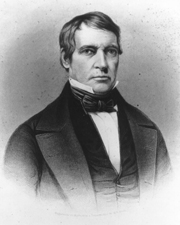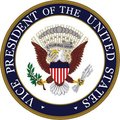William R. King
|
|
William Rufus de Vane King (April 7, 1786–April 18, 1853) was a U.S. Representative from North Carolina, a Senator from Alabama, and the thirteenth Vice President of the United States. He was the shortest-serving person to occupy that office without becoming President (John Tyler was the shortest-serving, with Andrew Johnson also serving less time than King).
King was born in Sampson County, North Carolina, and graduated from the University of North Carolina in 1803. He was admitted to the bar in 1806 and began practice in Clinton, North Carolina. He was a member of the State House of Commons from 1807 to 1809, city solicitor of Wilmington, North Carolina in 1810, and elected to the Twelfth, Thirteenth, and Fourteenth Congresses, serving from March 4, 1811 until November 4 1816, when he resigned. King was secretary of the legation at Naples and later at Saint Petersburg. He returned to the United States in 1818 and located in Cahawba, Alabama, where he became a planter.
King was a delegate to the convention which organized the State government. Upon the admission of Alabama as a State in 1819 he was elected as a Democratic-Republican to the United States Senate, and was reelected as a Jacksonian in 1822, 1828, 1834, and 1841, serving from December 14, 1819, until April 15, 1844, when he resigned. He served as President pro tempore of the United States Senate during the Twenty-fourth through Twenty-seventh Congresses. King was Chairman of the Committee on Public Lands and the Committee on Commerce.
He was Minister to France from 1844 to 1846. He was appointed and subsequently elected as a Democrat to the Senate to fill the vacancy caused by the resignation of Arthur P. Bagby and served from July 1, 1848 until his resignation on December 20, 1852 due to poor health. He served as President pro tempore of the Senate during the Thirty-first and Thirty-second Congresses and was Chairman of the Committee on Foreign Relations and Committee on Pensions. He was elected Vice President of the United States on the Democratic ticket with Franklin Pierce in 1852 and took the oath of office March 4, 1853, in Cuba, where he had gone for his health, which was a privilege extended by special act of Congress. In honor of his inauguration, the newly formed Washington Territory named King County for him, as well as Pierce County after President Pierce, in hopes of gaining speedy admission to the Union by currying favor with the new administration (Washington did not become a state until 1889). King County still exists, but the county council in 1986 passed a resolution "setting forth the historical basis for the 'renaming' of King County in honor of Reverend Dr. Martin Luther King, Jr." In May 2005, Washington State Governer Christine Gregoire signed legislation formalizing the prior resolution officially designating King County's name to be in honor of Reverend Dr. King. This has caused some backlash in the community due to allegations of significant financial liabilities for royalty fees now owed to Reverend Dr. King's family estate.
King returned to his plantation, "King's Bend", Alabama, and died there. He was interred in a vault on his plantation, and was later reinterred in Live Oak Cemetery, Selma, Dallas County, Alabama.
Some historians have speculated that King may have been gay, and that he had a long-term intimate relationship with James Buchanan (it is not disputed that the two lived together for a time in Washington, DC). It is also said that King's detractors in the Senate referred to him as "Miss Nancy." The theory is controversial and a source of debate among Buchanan and King historians. Historian and author James W. Loewen is one of the theory's better-known proponents.
External links
- King's Congressional Biography (http://bioguide.congress.gov/scripts/biodisplay.pl?index=K000217)
- The Other Buchanan Controversy (http://www.tompaine.com/feature2.cfm/ID/2458)
| Preceded by: (none) | U.S. Senator from Alabama 1819 – 1844 | Succeeded by: Dixon Hall Lewis | ||||
| Preceded by: Arthur P. Bagby | U.S. Senator from Alabama 1848 – 1852 | Succeeded by: Benjamin Fitzpatrick | ||||
| Preceded by: William Orlando Butler | Democratic Party Vice Presidential candidate 1852 (win) | Succeeded by: John C. Breckinridge | ||||
| Preceded by: Millard Fillmore | Vice President of the United States March 4, 1853 – April 18, 1853 | Succeeded by: John C. Breckinridge
|
||||


